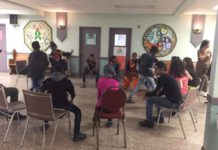It is coming to the end of the year, a time which many people are sharing memories of the past months and reflecting on lessons learned as we move into a fresh new start.
Did you know that 2019 was declared the International Year of Indigenous Languages by the United Nations?
While you reflect on how far you’ve come since January, have you considered what Indigenous languages you have exposed yourself to?
The United Nations developed this observance to raise awareness of the consequences of endangerment and loss of Indigenous languages.
It might be hard to understand those consequences if you speak languages such as English or French—these languages are noun-oriented, and focus on individual words that can be pointed out as having individual meanings.
There is little relationship expressed between the noun and its purpose unless it is specifically described by the speaker.
Indigenous languages are vastly different. An object’s purpose is almost always described right as the object is referred to.
I am a Mohawk language learner, so I can share a Mohawk perspective.
Kanien’kéha (Mohawk) is a verb-based language, while English is a noun-based language. This means that ideas in the Mohawk language are described around verbs as opposed to nouns.
Our individual words are developed in such a way that the action of the noun is prioritized over the noun itself… For example, ’medicine’ is not just ’medicine,’ our word directly translates to ’that which sustains our lives.’
The word for ’pencil’ directly translates to ’you write with it.’ And so on and so forth… Even our word in response to a sneeze is a command telling the person to ’live!’ There are many verbs in Kanien’kéha that can not be spoken as a word unless you describe who is doing the action, where the action is taking place, when the action occurred, who was doing the action to whom… A word is not complete unless its context is offered.
English and French words to not capture the animation of the world in this way.
Verb-based languages such as Kanien’kéha inherently describe the speakers’ cultural understandings.
Without our specific word for medicines, we lose a lot of our connection to the meaning of those medicines.
This is why, when someone says ’if we lose our language we lose our culture,’ they are not exagerrating in the slightest: the two are interlinked and cannot be divided.
Our cultures can not survive without the language that describes them to the detail that is required for our cultures to prevail.
It is like this all over the world.
Especially in the face of climate change and environmental injustice, understanding how to describe the land as it was originally care for is a major step in understand what the land needs and what the land can offer.
I wildly encourage people to learn the languages of the land they stand on.
It is my belief that you can not have a holistic appreciation for where you live, work, and play unless you learn some of the words that express its own livelihood.
I encourage you to seek Facebook groups, apps, websites, and more while prioritizing Indigenous people’s accessibility to these spaces before your own if you are non-Indigenous.
There are still a couple months left of the United Nation’s International Year of Indigenous Languages.
Please, please, please—learn some words.
An excellent opportunity on campus is already available—Mohawk classes are available at Renison!






























